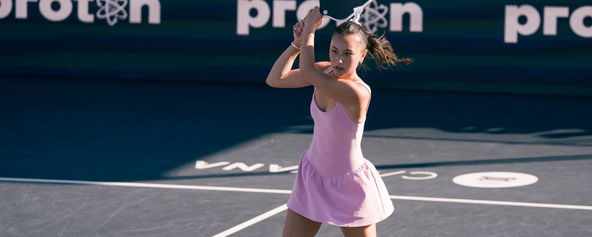
A therapist's advice: Handling an aggressive opponent on the court
Given the number of fights that have broken out on the court recently, we need to be better prepared to handle moments of conflict when they arise.
Florida-based marriage and family therapist candidate (MFTC), Marlee Bigsby, shared some insight on navigating these difficult situations.
“In a competitive environment, players being competitive by nature can often drive people to have heightened emotions. Winning and performing well is very important to these kinds of people,” Bigsby explained. “Often in those scenarios, those people are reacting to what’s happening instead of responding to what’s happening. Whether that’s because the game isn’t going their way or maybe their partner didn’t do something they wanted them to do, there’s so many different things that could cause an outburst.”
Bigsby advised that when you are across the court from someone who is tense or portraying heightened emotions, reassure yourself and focus on what you can control and what’s out of your control.
“What’s not in my control is my opponent’s emotions and the way they react. That’s completely out of my control. In that moment, I would reassure myself that no matter what happens, I have control over my response to the game, my opponent, etcetera,” she explained.
But sometimes, your opponent is just plain rude.
Whether they’re heckling or trash talking, sometimes people are just pushing your buttons.
“It’s always important to remain calm, of course. Often just taking a deep breath can help regulate the nervous system. Also, start to notice what emotions are going on within you. And be curious about them, but you don’t have to react to those emotions, just notice and identify them.”
She also quoted Steven Covey, author of The Seven Habits of Highly Effective People.
“Seek first to understand, and then to be understood.”
“That quote has always resonated with me, especially when it comes to conflict and someone who is very high strung. If I can communicate some understanding to them, usually that will end up better for me when I’m actually able to communicate with them, and then they feel like they’re understood,” she said. “Try to see their perspective, even though you might not feel like it’s rational, but seek first to understand where they’re coming from and what’s going to ultimately reach a solution.”
At the end of the day, it’s just a game. And if you find yourself in open play against someone who’s crossing the line and not showing good sportsmanship, it’s okay to walk away.
Protect yourself and your peace on the pickleball court.
Want more helpful tips? Follow us on Instagram and X (formerly Twitter) for expert-backed advice about every element of the game.
Related articles

Five pickleball habits that could be holding your game back
If you want to perform like the pros, it’s time to start making key adjustments.
3 days ago
-Pickleball.com Staff

Alix Truong’s advice for going pro: 'You can only get better with experience'
Playing alongside the best is an ongoing journey of learning and growth.
4 days ago
-Victoria Radnothy

For Hunter Johnson, reaching No. 1 in men’s singles was always the goal
He never lost sight of his primary objective.
5 days ago
-Victoria Radnothy

Greg Dow says improving at pickleball is 'really about getting your weaknesses to not be weaknesses'
The simplest tips are sometimes the most effective.
6 days ago
-Victoria Radnothy